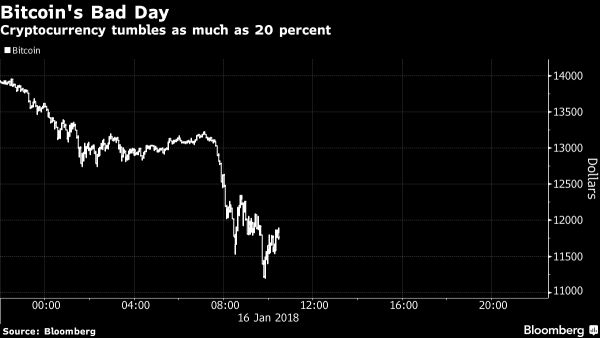.jpg)
Bitcoin slumped as much as 20 percent, giving more impetus to a January selloff in cryptocurrencies, after South Korea’s finance minister repeated that the country may ban trading in one of the world’s most active markets.
The largest digital coin was down 16 percent to $11,755 as of 10:15 a.m. in London, the lowest level since late December, according to composite pricing on Bloomberg, bringing an end to its two-day rally. Rival cryptocurrencies also plunged, with Ripple diving as much as 33 percent.
“The finance minister made it clear they’re definitely considering banning crypto trading — and it’s probably the third-largest market,” said Neil Wilson, senior market analyst in London for online trading platform ETX Capital. “The news is hitting prices and broader sentiment, and it follows China’s move to shutter mines.”
Speculators across the globe are struggling to determine when or how market watchdogs may crack down on an industry that’s decentralized and derives much of its value from anonymous ownership. Many assertions that digital coins represent a bubble have triggered double-digit selloffs over the past year, often to be followed by rebounds.
In South Korea, shutting down cryptocurrency exchanges is still an option, Finance Minister Kim Dong-yeon said in an interview with TBS radio. But measures first needs “serious” discussion among ministries, Kim added, holding out hope for traders that the crackdown won’t go that far. Kim said there’s irrational speculation and that rational regulation was needed.
Steven Maijoor, chairman of the European Securities and Markets Authority, said investors “should be prepared to lose all their money” in bitcoin, in a Bloomberg TV interview in Hong Kong. “It has an extremely volatile value, which undermines its use as a currency. And it’s also not broadly accepted.”
The ESMA warned retail investors against initial coin offerings in November and is monitoring developments in cryptocurrencies, Maijoor said.
China, which first began targeting the industry last year, is escalating its clampdown on cryptocurrency trading, particularly online platforms and mobile apps that offer exchange-like services, according to people familiar with the matter.
